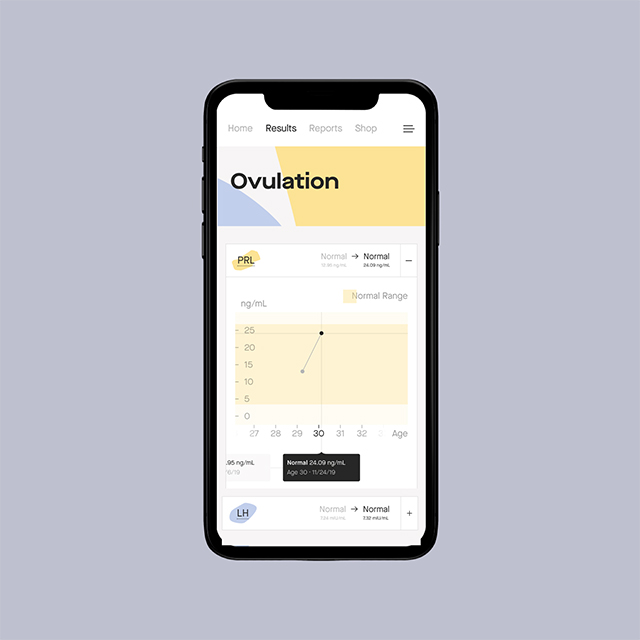Page 1 of 7
Suggested ad (Modern Fertility)
Slideshow: What a hormone test can tell you about your fertility
A hormone test from Modern Fertility can help you unlock personalized info about your ovulation and ovarian reserve, so you can make informed decisions about your unique fertility.
Page 2 of 7

If you could have more or fewer eggs than average for your age
The number of eggs you have is called your ovarian reserve and you can use the hormone AMH to measure it. When tracked over time, testing helps us understand our reproductive windows—which decline over time at different rates for different people. Ovarian reserve testing is also valuable in understanding when we could reach menopause and in assessing egg freezing and IVF outcomes.
Page 3 of 7

How your ovulation hormones are functioning
Modern Fertility checks your Prolactin and LH levels to give you clues about what’s going on with your cycle. The first two things you need to know are that Prolactin is the same hormone that encourages milk production (high levels can interfere with ovulation), and LH is the hormone that regulates ovarian function.
Page 4 of 7

How your thyroid controls…everything
Your thyroid hormone levels affect ovulation, your mood, skin, weight, and even how tired or hungry you feel. Even teeny glands like the thyroid and short, three-letter acronyms like TSH can give you a big-picture perspective of your health. Your thyroid results can play a role in your TTC process. OB-GYNs might approach a “normal” result differently if you’re trying to conceive, so it’s a good idea to bring up your results with a fertility nurse during your free 1:1.
Page 5 of 7

Egg freezing or IVF outcomes
Doctors use ovarian reserve hormone testing to determine success rates for egg freezing and IVF. Learning about your AMH levels (which indicate your ovarian reserve) can help predict how successful ovarian stimulation—that’s when you take hormones to generate eggs—might be, should you decide to freeze or go through IVF.
Page 6 of 7

Risk factors for PCOS
PCOS is one of the most common, but treatable, causes of infertility in women—and 1 in 10 women have it. In women with PCOS, a hormonal imbalance interferes with ovulation, and if you don’t ovulate, you can’t get pregnant. Hormones can play a role in detecting PCOS, but can’t diagnose it. If your hormone levels indicate that PCOS may be in the cards, speak with your provider about PCOS.
Page 7 of 7

You get the whole picture with Modern Fertility
Take charge of TTC with the most comprehensive fertility hormone test you can take at home to be proactive about your fertility. Build your custom fertility plan with personalized hormone insights and support from Modern Fertility.
This ad is brought to you by Modern Fertility



